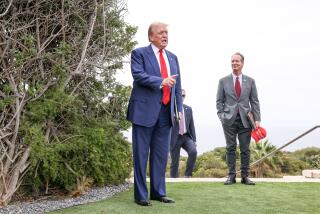POLITICAL BRIEFING
- Share via
FRESH STIRRINGS? Democratic presidential hopefuls finally begin to step up their pace. Tennessee Sen. Albert Gore Jr., House Majority Leader Richard A. Gephardt (D-Mo.) and the Rev. Jesse Jackson are scheduled to address a meeting of Jackson’s National Rainbow Coalition in Washington this week. Next week, the Wisconsin Democratic Party will convene and stage the “first cattle show” of the year. Among those scheduled to appear: Arkansas Gov. Bill Clinton, West Virginia Sen. John D. (Jay) Rockefeller IV and former Sen. Paul E. Tsongas of Massachusetts, the only one of the potential nominees who has announced his candidacy so far. Tsongas and Clinton are also planning to make the rounds at a Democratic Governors’ Assn. gathering in Colorado later this month. And several potential candidates, including Clinton and Gore, are expected at a meeting of the Democratic National Committee’s Southern Caucus in Raleigh, N.C. But the month’s best forum may belong to Rockefeller: During the last week in June, the National Commission on Children, which he chairs, is slated to release its long-awaited report.
CAUCUS CONUNDRUM: Iowa Democrats have mixed feelings about the potential presidential candidacy of their state’s junior senator, Tom Harkin. Although they like the idea of having a favorite son in the competition to be the party’s standard-bearer, they worry that Harkin’s candidacy might diminish the importance of their state’s precinct caucuses, which traditionally kick off the nomination process.
Fears are that, at the least, conservatives might use Harkin’s candidacy as an excuse to avoid competing in the caucuses, where the outcome is heavily influenced by liberal activists. On the other hand, long-shot candidates might still find the state a valuable testing ground, as it was for Jimmy Carter, whose 1976 victory in Iowa set him on the road to the nomination. Among those who might try to follow in Carter’s footsteps are Tsongas and Virginia Gov. L. Douglas Wilder.
Meanwhile, Harkin has already set up a special bank account under the federal election law to finance his testing of the political waters. His early itinerary includes New Hampshire and Los Angeles, where he will meet with fund-raisers this weekend.
TEXAS CONNECTION: Latino gains in redistricting efforts around the country may heighten pressure for a dramatic increase of Latino representation in California. Although Latinos currently are fully one-fourth of the Golden State’s population, they hold only three of its 45 congressional seats. By contrast, in Texas, where Latinos make up an equal share of population, redistricting plans under discussion by both Democrats and Republicans would create two new Latino congressional seats--to give them six of that state’s 30 House slots, or one-fifth of the total. The final lines will be drawn at a special session of the state Legislature, beginning in July. Latinos also appear likely to gain congressional seats in Illinois, Florida and, perhaps, Arizona. Those pick-ups would provide new ammunition for California’s Latino activists, who are hoping to gain as many as four of the seven new congressional seats coming to California. Also buttressing their case: calculations, released by a Latino advocacy group, showing that Latinos now constitute more than one-third of the population of nine California districts that are currently represented by whites or blacks. Most strikingly, Latinos now make up 61% of the South Central Los Angeles district represented by Maxine Waters, a black Democrat.
More to Read
Get the L.A. Times Politics newsletter
Deeply reported insights into legislation, politics and policy from Sacramento, Washington and beyond. In your inbox twice per week.
You may occasionally receive promotional content from the Los Angeles Times.










